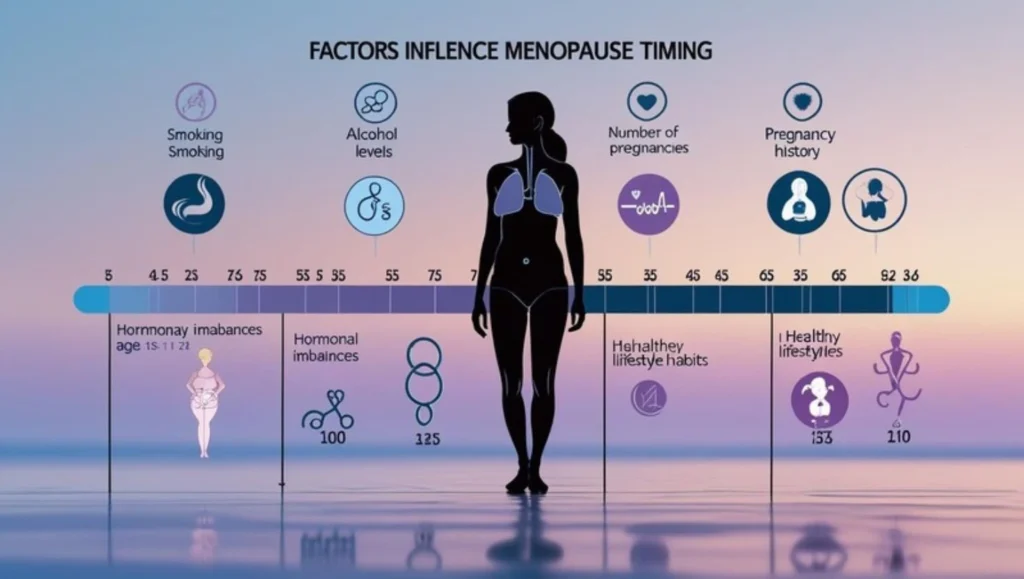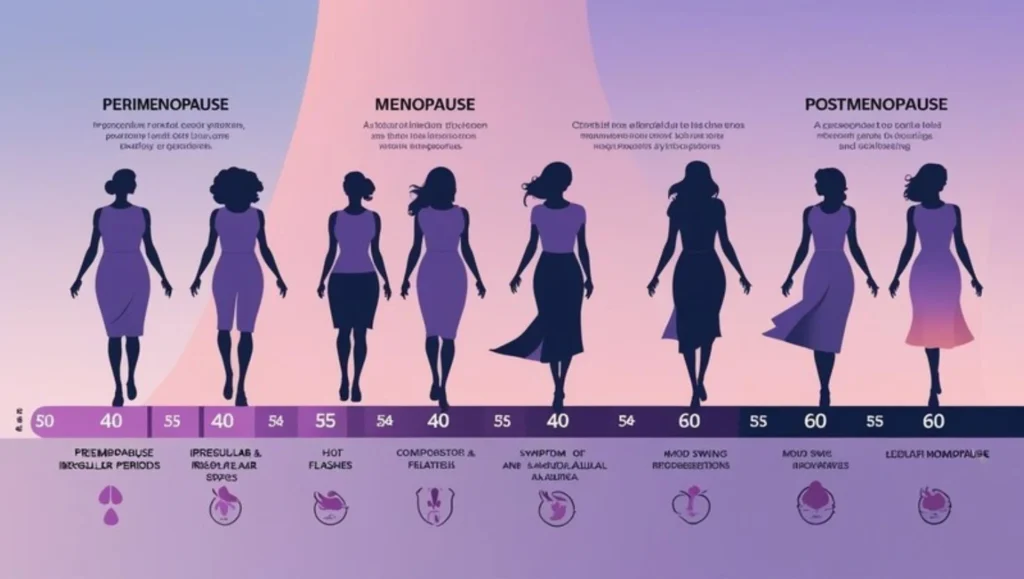Understanding when menopause might begin is a big deal for many women. That’s where the Menopause Age Calculator comes in handy. This simple tool helps estimate your timeline based on personal and family factors. By using it, you can prepare early, adjust your health goals, and manage symptoms better. It helps track estrogen levels, identify perimenopause signs, and spot menstrual irregularities before full menopause hits. It also considers your medical history and menopause patterns to give you a clearer picture. While not exact, it’s one of the most natural menopause predictors available. Knowing when it may happen empowers you to plan a healthier future.
Menopause Age Calculator
Your Results
Remember this is only an estimate. The average age for menopause is 51, but it can normally occur between ages 45-55.
Factors that may influence your menopause age:
- Genetics: Family history is one of the strongest predictors
- Smoking: Can cause menopause to occur 1-2 years earlier
- Pregnancy history: Women who have been pregnant may experience later menopause
- Ethnicity: Some ethnic groups tend to experience menopause earlier or later
- Body mass index: Women with higher BMI may experience later menopause
Understanding Menopause — What It Is and Why It Matters
Menopause is the natural end of a woman's reproductive years. It happens when the ovaries stop making eggs and your periods stop for 12 straight months. This time is marked by hormonal changes during menopause, especially a big drop in estrogen levels.
Most women go through perimenopause before menopause. This is a stage when you might see menstrual irregularities, mood swings, and hot flashes. Knowing when it may happen helps you build a menopause management plan. It also makes it easier to handle mental health during menopause and physical changes with better care.
Average Age of Menopause Onset
The average age of menopause in the USA is around 51. But it can start anytime between ages 45 and 55. This is the general menopause transition timeline, but it differs for each woman.
Some experience early menopause symptoms in their 30s or early 40s. Others may face late menopause causes that push the age into the late 50s. Genetics, environment, and your health habits all play a role in this. So do genetic menopause patterns passed from mother to daughter.
Key Factors That Influence the Timing of Menopause

Smoking, Alcohol & Lifestyle Habits
Your lifestyle choices greatly affect female reproductive health. The impact of smoking on menopause is strong. Women who smoke often go through menopause 1 to 2 years earlier than those who don’t.
The link between alcohol and menopause onset also matters. Regular alcohol use can disturb estrogen levels, affecting when your periods stop. Staying active and eating healthy supports health during menopause.
Pregnancy, Childbirth & Reproductive History
How many kids you've had also plays a part. Women with more pregnancies may face later menopause. A full history of birth control, fertility issues, or surgeries like hysterectomy also changes your path.
Knowing your medical history and menopause connection helps build your personalized menopause timeline. It allows your doctor to give better advice on what's ahead.
Chronic Stress or Trauma's Role in Timing
Long-term stress can cause hormonal changes during menopause. High levels of cortisol may speed up the process. Trauma in early life or adult years also has a link to premature menopause risks.
Keeping stress low with meditation, sleep, and self-care helps slow down these effects. It also supports your mental health during menopause, which is just as important as physical health.
Menstrual Cycle Patterns and Hormonal Imbalance
Your menstrual cycle changes can give early hints. If you notice irregular periods or your flow is heavier or lighter, these may be signs of perimenopause. These changes show that your hormones are shifting.
If cycles are skipping or your PMS is worse, your personalized menopause timeline may be starting. You might want to talk to a healthcare provider for menopause help and get hormone testing done.
Using the Menopause Age Calculator Effectively
A menopause age calculator asks you about your age, your mother’s age at menopause, and your period status. It may also ask if you smoke, drink alcohol, or have health issues. This gives an idea of your likely timeline.

These natural menopause predictors use both science and family history. They are helpful but not 100% exact. Still, they let you plan ahead for menopause-related nutrition, mental changes, and lifestyle updates.
Recognizing the Early Signs of Menopause
The first signs often show up during perimenopause. These include hot flashes, night sweats, and mood swings. You may also feel tired, gain weight, or lose sleep. These are common estrogen decline symptoms.
You may also notice weight gain during menopause, especially around the belly. Skin dryness, menstrual irregularities, and trouble focusing are other signs to watch for.
How Long Does the Menopausal Transition Last?

The menopause transition timeline usually lasts from 4 to 8 years. It starts with perimenopause and ends after menopause, known as postmenopause.
Your body slowly adjusts as estrogen levels drop. If your periods are gone for a full year, you're considered in menopause. After that, your body may still show changes for a few years.
Lifestyle Changes to Prepare for Menopause
Exercise and diet play big roles. Weight-bearing activities improve bone density and reduce mood swings. Yoga and walking lower stress, helping balance your hormones.
Eat foods rich in phytoestrogens, like soy and flaxseeds. Boost calcium intake after 40 and get plenty of vitamin D for women to protect bones. These simple changes improve your health during menopause.
Tools & Calculators to Support Your Journey
You can use more than one tool to track progress. These include:
| Tool | Purpose |
|---|---|
| Menopause Age Calculator | Predicts menopause onset |
| Hormone Testing Kit | Checks hormone levels at home |
| Nutrition Macro Calculator | Helps track calories and nutrients |
| Sleep Tracker | Records sleep issues from night sweats |
These tools help build your menopause management plan. They also help you talk clearly with your doctor.
Expert Advice, Support Groups & Education
Talking to a healthcare provider for menopause is key. They can test your hormones, check your bone health, and recommend treatments like hormone replacement therapy if needed.
You can also join forums, online groups, and read books. These menopause support resources offer tips, comfort, and knowledge. They remind you that you're not alone in this journey.
FAQs About Menopause and the Age Calculator
Can This Calculator Predict Menopause Accurately?
It offers an educated guess. It considers many personal factors. Though it's not exact, it's a useful start in preparing for this life stage.
Should I Recalculate Macros Regularly After 40?
Yes. Your body's metabolism changes. Keeping your nutrition in check helps with weight gain during menopause and energy levels.
Do Macros Help With Weight Loss During Menopause?
Yes, balancing macros supports fat loss and muscle retention. Focus on more protein and fewer refined carbs.
Is It Necessary to Track Calories Too?
It helps, especially if you're gaining weight. But combining calorie awareness with macro tracking is best.
Should Protein Be Prioritized in Menopause Nutrition?
Absolutely. Protein fights muscle loss and helps you feel full longer. It also supports better energy and mood.
Are These Recommendations Safe Long-Term?
Yes. These are based on long-term health science. Just be sure to talk with your doctor before starting new plans.

